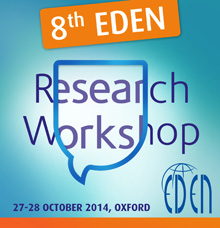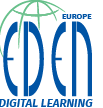2007 Naples
Snapshot of the Scene
The rush is on: the rapid evolution and widespread penetration of new media and technologies, emerging new tools and solutions constantly change and challenge the ways and means of accessing and sharing knowledge.
2009 Gdansk
Innovation, learning and learning innovation in Europe
Europe's growth potential needs to be enhanced for sure. Europe needs a strategic approach to boost its capacity for creativity, whilst establishing an environment where knowledge is successfully converted into innovative products and services. For a flexible, competitive and open economy, independent innovation as the main driver of development has been fully acknowledged.
2001 Stockholm
Informal arenas of learning
Much learning occurs beyond traditional lecture halls and formal credit programmes.This strand addresses different aspects of integrating multiple forms of learning opportunities into daily life and in the workplace.
Tearing down boundaries
Distance education methods are often embedded in the developing new structures of education. Ways of working in different education systems seem to merge. Do we also need a merge between education systems and the breaking of barriers between educational sectors and institutions?
2010 Valencia
Taken by Storm
The volume of information we get is enormous and there is a revolutionary change in the ways we use media. New social media culture is extending human capacity, reshaping identity and community. The awareness of the many forms of digital media is increasing and of the skills that allow better intellectual and emotional understanding.
2011 Athens
Conference Scope
Crisis, change and innovation
Recent waves of economic crisis and uncertainty have re-aligned a range of European and global issues. This sense of crisis and challenge however may also serve to energize system transformations, identify alternatives, suggest new directions and act as a driving motivating force when old modes are broken.
2011 Dublin
Different Perspectives on Sustainability
The issue of a socially and environmentally sustainable future is high on the global agenda. We now face problems of an exceptionally complex nature. Sustainability is therefore acquiring a new meaning as an inclusive concept, where its scope extends far beyond purely environmental dimensions.
2012 Leuven
Learners in the Driving Seat – Users? – Partners? – Consumers? – Peers? Where are we heading to?
2012 Porto
Social and policy context
The European Year and movements for Active Ageing
The population in Europe is getting older. The EU Commission stressed in the Europe 2020 strategy the importance of healthy and active ageing. Values represented by mature citizens are becoming increasingly important in contemporary European societies. The year 2012 will be "The European Year of Active Ageing and the Solidarity Between Generations".
2013 Oslo
E-learning, open and distance education have been increasingly important fields of intellectual excitement and innovative development. The challenges posed by the new technologies are permanent, and students constantly keep teachers under pressure to develop. The human elements are moving to the forefront, employing creative methods and smart solutions. In Europe, despite economic and social pressures, there is a collective drive towards realising the creative potential.
2014 Zagreb
The Conference Shortcuts
Book of Abstracts | Keynote presentations | Programme (PDF) | 2014 Best Research Paper | <a href="https://eden-europe.3ip.eu/nap_elgg/mod/file/down

2014 Oxford
Challenges for Research into Open & Distance Learning: Doing Things Better: Doing Better Things
2015 Aalborg
17-20 November 2015, Aalborg, Denmark
Conference website: http://www.d4l.aau.dk/
Venue: Laereruddannelsen UCN, Teachers' College, University College of Nordjylland, Aalborg, Denmark

